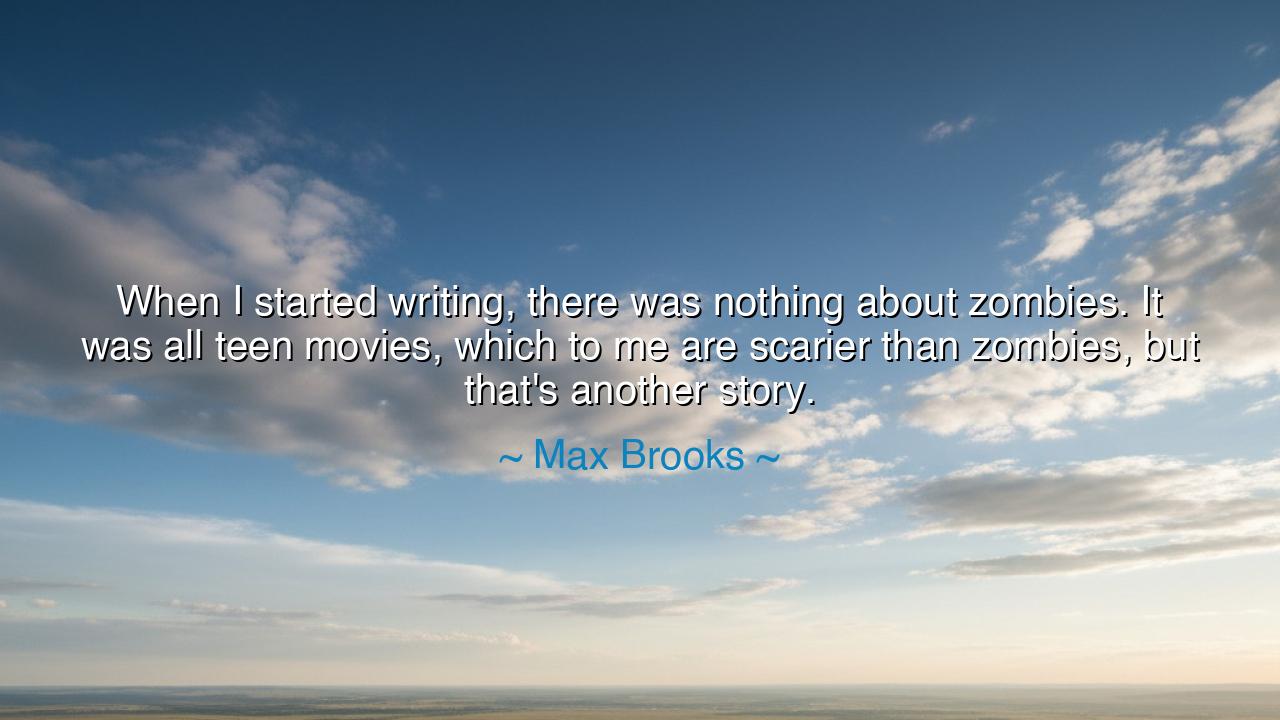
When I started writing, there was nothing about zombies. It was
When I started writing, there was nothing about zombies. It was all teen movies, which to me are scarier than zombies, but that's another story.






When Max Brooks proclaimed, “When I started writing, there was nothing about zombies. It was all teen movies, which to me are scarier than zombies, but that's another story,” he revealed a truth both humorous and profound. He spoke not only as the author who would one day bring forth the legendary World War Z and The Zombie Survival Guide, but also as a man who saw in human society its true terrors—not in the walking dead, but in the anxieties of youth, conformity, and the relentless pressures of social order. His words remind us that sometimes the horrors of life are not the monsters of imagination, but the quiet judgments of our peers and the fears of not belonging.
The origin of this wisdom lies in the cultural landscape into which Brooks began his writing. In that time, before the great wave of zombie fascination overtook film and literature, the public imagination was consumed by teen movies—bright, exaggerated depictions of adolescence, filled with cliques, status, and the unspoken terror of rejection. For Brooks, who would become master of crafting apocalyptic nightmares, it was this arena of high school drama that felt most suffocating, more frightening than the groaning dead. Why? Because the zombie apocalypse is straightforward: fight, run, survive. But the apocalypse of adolescence is subtler, filled with invisible wounds and emotional battles that can leave scars far deeper.
History shows us that the greatest fears are not always beasts or plagues, but the pressures of society itself. In ancient Athens, the youth of noble families trained constantly to avoid dishonor, fearing shame more than wounds in battle. In feudal Japan, samurai children were raised with the dread of failing their house’s name, a fear sharper than the enemy’s blade. And in the modern age, young people often find themselves more terrified of social rejection, loneliness, or ridicule than of any tangible monster. Brooks’ words expose this truth with wit: the “zombies” of imagination pale compared to the real terrors of human expectation.
Consider the story of Mary Shelley, who at only nineteen gave the world Frankenstein. Her monster was not merely a creature stitched together from corpses—it was the reflection of society’s fear of the outsider, the unloved, the misunderstood. In the same way, Brooks hints that the monsters we most fear are not the undead, but the alienation of youth, the cruelty of peers, and the unbearable silence of being excluded. Teen movies, though wrapped in light humor or melodrama, embody these struggles, making them as frightening, in their own way, as the hordes of the undead.
The lesson here is sharp: do not dismiss lightly the struggles of the young, nor belittle the horrors of adolescence. While adults may laugh at the dramas of school halls, to those within them, the stakes are as high as life and death. And for the writer, the artist, or the thinker, it is a reminder that true horror is not always found in the extraordinary but often in the ordinary, where every person has lived. Thus, Brooks teaches us that the storyteller must listen closely to the unspoken fears of the heart, for they are as universal as they are invisible.
From this reflection flows practical counsel: if you are young, know that your struggles are not trivial; they are part of the ancient pattern of humanity’s growth. If you are older, remember the terrors of your own youth, and offer compassion rather than dismissal. And to all who create, understand that the most enduring stories are not about the monsters outside, but about the monsters within—the loneliness, the shame, the fear of rejection, the yearning for acceptance. These are the fears that bind all people together.
So let Brooks’ words echo as both jest and wisdom: zombies may be terrifying, but the halls of youth are more haunting still. In recognizing this, we are called to empathy, to remembrance, and to courage. For whether we face the walking dead or the silent judgments of our peers, the answer is the same—stand firm, know your worth, and confront your fears with resolution. Then, whether in apocalypse or adolescence, you will walk through the darkness with unshaken spirit.






AAdministratorAdministrator
Welcome, honored guests. Please leave a comment, we will respond soon